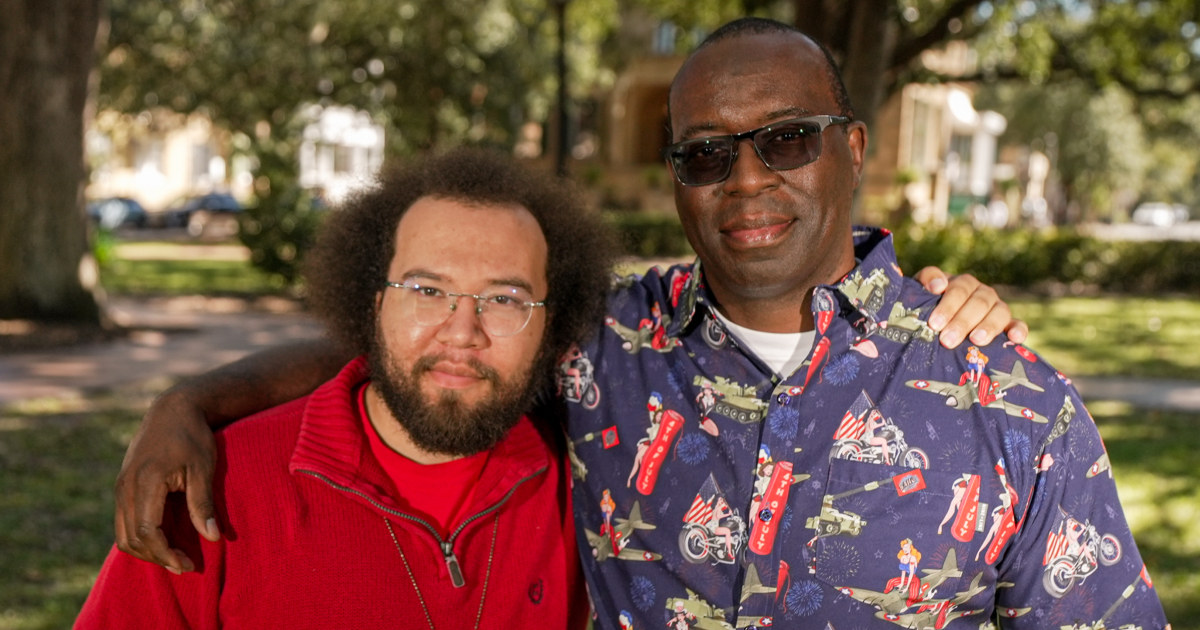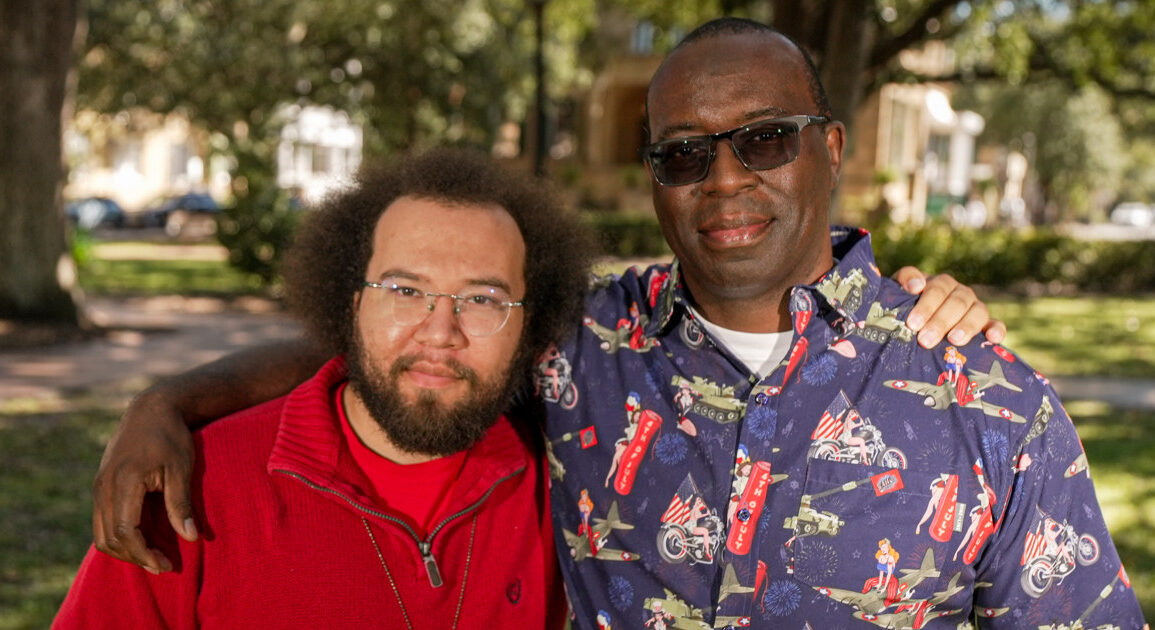
SAVANNAH, Ga. — David Shockley doesn’t understand his son Darius’ political ideology. A longtime resident of Savannah and an aircraft mechanic instructor, the elder Shockley fumbled through trying to describe his son’s ideals.
“It makes no sense,” said David, who is Black and plans to vote for former President Donald Trump for a second time. He admits it hurts to know that he and his son, who identifies as a leftist, plan to vote for opposing candidates.
“It’s like, where did I go wrong?” he said. “Did I miss a step in raising him?”
The two live in the same house together, share similar hobbies and love each other but their views on who should be the next president could not be more opposed.
The Shockleys represent a stark generational divide on politics, particularly between parents and their young-adult children. The latest NBC News Stay Tuned Gen Z poll, powered by SurveyMonkey, found that more than half of Gen Z respondents ages 18 to 29 say they have different political views than at least one of their parents. About a third say they differ from both parents.
The political opinions of those closest to Gen Zers do matter, however, with the poll finding that 45% of the demographic pays attention to the opinions of family, friends and co-workers, more than political leaders (36%) or organizations they belong to (31%).
And yet younger Americans split from the rest of the country on their 2024 presidential preference, with half of Gen Zers saying they plan to vote for Harris and a third for Trump, while the latest national NBC News poll shows the overall race as a virtual tie.
Political experts say that while it’s not surprising younger voters prefer Harris, it is revealing.
In the 2020 election, 60% of voters ages 18 to 29 chose Joe Biden, according to NBC News exit polling, while 36% cast their vote for Trump. Democrats Hillary Clinton and Barack Obama also won this group by similar margins.
A begrudging Democrat who doesn’t think the party is progressive enough, Darius said he plans to vote for Vice President Kamala Harris because she most closely aligns with his values of “compassion for my fellow man.”
Voting in his second presidential election, Darius, 25, recalls the moment he split from his dad’s political views. He overheard a conversation his father was having about Obama during his re-election campaign in 2012. Darius was 12.
“I remember that conversation and being like, ‘What? Is there something wrong with Obama?’” Darius said. For the first time, Darius, whose mother is white, said he saw himself in Obama, whose own parents were Black and white. He said he could imagine himself running for president one day. He couldn’t understand at the time why his father did not and would not support him. Darius said he hopes Harris can be a similar role model for young women in America, especially Black and Asian girls.
“I want more people involved in politics,” he said.
Understanding the generational contrast
Experts say there is a long tradition of generational divides in American politics, though scholars are often split on how to understand them.
“While it’s always been the case that young people have demonstrated different political views than their parents, the fact that media and news consumption is so much more fragmented now than in the past may be enhancing that trend, helping explain why the gap in Gen Z support for Harris and Trump appears so much wider than for the population as a whole,” said Ben Waterhouse, a professor of history at the University of North Carolina at Chapel Hill.
While younger Americans have leaned Democratic in recent decades, frequently coalescing around issues including climate change, gun reform and abortion, critics are cautious about saying the country as a whole will be more progressive in the decades to come.
“Some experts add all this up and see the potential for Gen Zs and millennials to combine forces and lead the U.S. leftward out of this intensely polarized era,” said Margaret Talev, director of Syracuse University’s Institute for Democracy, Journalism and Citizenship in Washington, D.C. “But some data also shows that Gen Z is slightly more conservative than millennials, and that the reshaping of both major parties’ identities could shuffle some of these voters’ allegiances in the years to come.”
Daniel Potter, director of the Kinder Institute for Urban Research’s Houston Population Research Center, said he will be curious to see how this divide changes in the next few presidential elections.
“As Gen Z ages,” he said, “will they follow the pattern of Generation X, millennials, and other generations that have come before and incrementally shift to vote more conservative, or continue to vote according to the progressive values, beliefs and preferences that currently define them?”
Darius is currently a graduate student studying political science at Georgia Southern University, where he also earned a bachelor’s degree in that discipline. When politics are discussed in the Shockley household, Darius said he leans into his political science background to pull out data points and history to form his arguments with his parents and younger brother.
“I tend to instigate some conversations about politics,” Darius said. “Whenever I read something on the news or hear something, I like to bring it up with my parents and ask them about it.”
David, on the other hand, confessed he doesn’t read or follow much news on a regular basis. When he and his son get into a passionate back-and-forth on issues ranging from the candidates’ crowd sizes to abortion, he said, it’s often Darius’ younger brother Will, who says something outlandish to break the tension and change the subject.
David said his traditional, conservative values are rooted in his Christian faith. But he also does not trust the inner workings of Washington, D.C. He thinks the national government overspends and believes it too often oversteps local government, which he said can better take care of communities.
Darius, meanwhile, favors an approach that provides a large safety net for more people, including health care for all Americans.
And while the two usually land on opposite sides of most issues, they try to hear each other out.
“I don’t agree with half the stuff he says, but at the same time, I’ll listen to him say it, give my opinion about it and my experience and let him go on and do his thing,” David said.
Both David and Darius — two Black men in a battleground state — are emblematic of a voter base that Democrats and Republicans see as integral to success. While Black men have historically supported Democrats by significant margins of 80%-90% in presidential elections, months of polling that has shown some softening among the group has presented an opportunity for Republicans.
But Harris’ entry into the race and her targeted outreach has won back some of that support. With efforts to court Black men by rolling out an “opportunity agenda” and sitting down for interviews with media geared toward Black men, including a radio town hall with Charlamagne tha God and the “All the Smoke” podcast with Matt Barnes and Stephen Jackson, Harris has been showing up frequently in Black male-dominated spaces in recent weeks.
Trump, for his part, has also leaned into Black men by cozying up to rappers like Kodak Black and Fivio Foreign (even appearing on a song with the duo), making barbershop visits in Atlanta and the Bronx, New York, and appearing on various podcasts to reach larger audiences of Black men.
But David says neither party prioritizes African Americans.
“I don’t think either party supports anybody,” he said, adding: “I think they’re all just for their own selfish needs and desires. But that being said, it’s not about Black and white for me. It’s not about party. It’s about who is saying what I want to hear countrywide.”
Despite their differences, the two come together on their shared love of “Star Wars” and ’80s bands.
“Despite the chasm between the political views, we still come together on our—” said David as he searched for the right word.
Darius jumped in: “Commonalities.”



